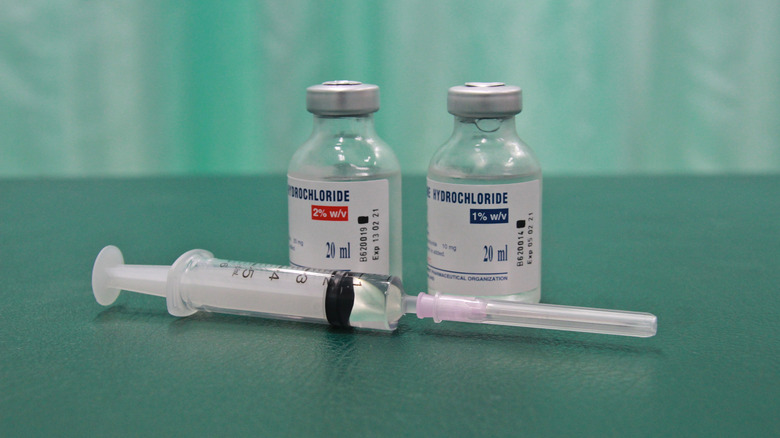Benzocaine Vs. Lidocaine: What's The Difference?
If pain isn't your friend but you're not exactly a fan of "going under" for whatever reason for certain medical procedures, you may be better off opting for a topical numbing jelly or ointment. But with all the options out there, which one should you go for? Many may not know that there are two main different types of topical local anesthetics: benzocaine and lidocaine. The two are both mainly used for numbing with various procedures that involve the skin, and can also treat sunburn, insect bites or bee stings, poison ivy and oak, and minor cuts and scratches. And according to The Mayo Clinic, they both can come in either gels, jellies, sprays, solutions, creams, and ointments.
However, despite these similarities, benzocaine and lidocaine are actually quite different when it comes to their properties and functions. And according to the medical procedure you're getting, it's best to choose wisely between the two. Keep scrolling to find out the main differences between benzocaine and lidocaine.
While lidocaine is stronger, benzocaine still has its benefits
One main difference between benzocaine and lidocaine is that benzocaine can be acquired without a doctor's prescription, while lidocaine cannot, according to The Mayo Clinic. Lidocaine must be prescribed by a doctor because it tends to be a stronger product overall, while benzocaine is more mild. Because lidocaine is stronger, it has also been proven to be more effective when it comes to reducing pain in general. In fact, according to a study by The Indian Endodontic Society, lidocaine is 10 times more effective against pain when inserted by a needle than benzocaine.
However, just because lidocaine is the stronger topical local anesthetic of the two, doesn't mean benzocaine doesn't have its uses as well. Because of benzocaine's less severe nature as a product, it is more suitable for soft tissues and mucous membranes such as the tongue and lips. Some over the counter drug store products such as ear drops, ulcer ointments, and sunburn treatments contain benzocaine as an ingredient. Lidocaine, on the other hand, is used for more intense procedures on other parts of the body such as surgical incisions (via Dr. Numb).
Overall, even though lidocaine has been proven to be stronger against pain, there are certain scenarios and areas where you're better off using benzocaine, meaning that one isn't inherently superior over the other.

